Resolution 2372 provides for the withdrawal of troops from the African Union Mission in Somalia (AMISOM) by 2021. However, this operation will take into account the realities on the ground.

Displaced Somalis fetching water from taps installed by Burundian troops
“Indeed, this resolution states that in 2021, the transition will have to be completed. But, it stipulates that this is a gradual and responsible process, “Francisco Caetano Madeira, Special Representative of the African Union Commission in Somalia told Burundian journalists on Monday, May 7, in Mogadishu.” We can consider the possibility that we will continue this mission beyond 2021, but perhaps in another context”. Everything must be done to preserve stability we have achieved since 2007, he added.
“We are not an occupying force,” said Major-General Charles Tai Gituai, deputy commander of AMISOM in charge of operations and planning arguing that the main mission of AMISOM is to eradicate Shebabs and to help communities start their socio-economic activities. “For this, the gradual transfer of responsibility to the Somalia security forces must be done without compromising the progress already made.”
Concerning the EU’s decision to cut troop salaries by 20%, Madeira says alternative solutions are under consideration. With this in mind, the African Union alongside the United Nations have appointed special envoys. “Their mission is to find alternative sources of funding for AMISOM”. He appreciates the AMISOM collaboration with the Chinese, Russians, Asian countries, and so on. “Even the EU has come to the conclusion that it needs to review its approach to AMISOM”.
Burundians, combative and appreciated
With 4900 troops, Burundi is one of the countries contributing troops to the AMISOM. Burundi contingent occupies Sector V in northern Somalia. Its staff is based at Jowhar Air Field, Hirshabelle State.
“We have already ensured security at more than 85% of the region,” said Brigadier General Victor Nduwumukiza, commander of the Burundi contingent in Somalia.
He however stated that the security situation remains volatile and unpredictable: “The Shebaabs are carrying out attacks on troop convoys with explosive devices. He referred to the Shebaabs attack occurred in March adding that Somalia national army is not yet mature and is in dire need of material.
He deplored that some Somalis still support Shebaab terrorists: “They hide them and provide them with information about our movements.”
The lack of mastery of Somali language is a major handicap to access information. “A Somali can have intention to give us information, but the language becomes an obstacle,” regretted Lieutenant-Colonel Jérémie Setarara, in charge of intelligence.
Many Somalis appreciate the work of Burundian troops and demand that they stay in the country. “Thank you for having made supreme sacrifice to save Somalia. We do not want AMISOM to leave as long as the Shebaabs are still there, “said Muhamed Ali Adle, Hirshabelle State Interior Minister. This Somali authority, met in Jowhar, asks Burundian troops to train Somalis to take over the right moment.
This Somali minister assures that Burundians have become their true friends: “When your brother kills you, and a foreigner dies for you, he becomes a brother.”
In addition to ensuring security, the Burundian troops are treating Somalis and making drinking water available. Burundian troops distribute water to 19 displaced people of the site installed near the staff of the Burundian contingent.
Written by Rénovat Ndabashinze and
translated by Lorraine Josiane Manishatse


















 IWACU Open Data
IWACU Open Data

